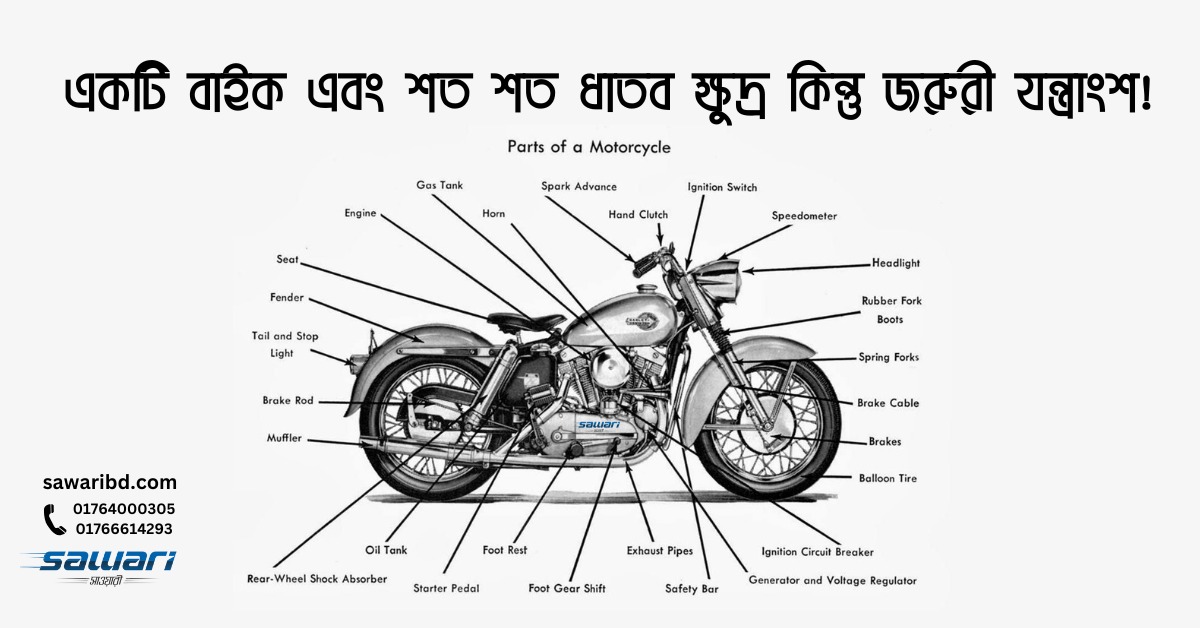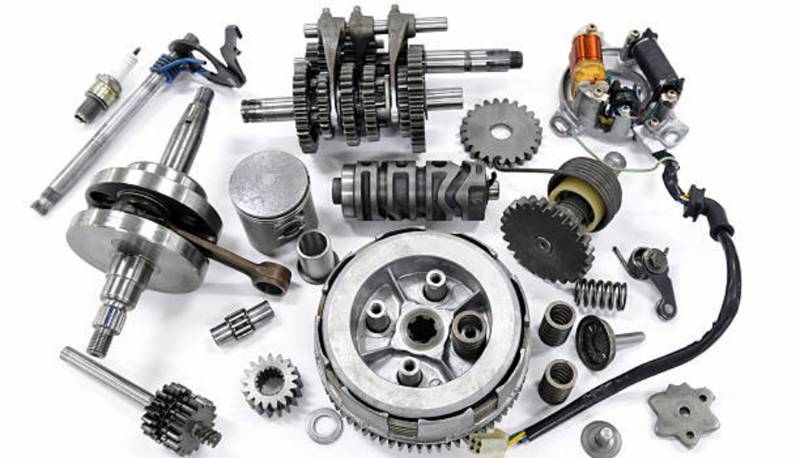Maximize Your Ride with High-Efficiency OEM Parts New Zealand
Maximize Your Ride with High-Efficiency OEM Parts New Zealand
Blog Article
Discover the Vital MotorBike Components You Need for Optimal Performance
Recognizing the important parts of a motorcycle is fundamental for achieving peak performance. Each part, from the engine to the braking system, plays an essential role in overall performance and safety. Regular maintenance can avoid unforeseen failures and enhance the riding experience. Numerous cyclists ignore the details of these systems. Finding how they interact can cause a more efficient adventure. What vital components should every motorcyclist prioritize?
The Engine: The Heart of Your Motorcycle
The engine functions as the core part of a bike, driving its performance and defining its abilities. It is responsible for converting fuel right into power, which powers the bike onward. Different sorts of engines are utilized, including single-cylinder, V-twin, and inline setups, each offering distinct features suited for different riding functions and designs. The engine dimension, typically gauged in cubic centimeters (cc), considerably influences performance, with larger engines usually providing even more power and torque.Furthermore, the engine's style and technology, such as gas injection systems or air-cooling versus liquid-cooling, impact effectiveness and reliability. Maintenance is vital for peak procedure; elements like routine oil modifications and monitoring ignition system assurance long life. Riders usually take into consideration an engine's responsiveness and smoothness, as these characteristics enhance the overall riding experience. Inevitably, the engine stays an important aspect that defines not just the motorcycle's performance yet also the rider's link to the equipment.
The Transmission: Shifting Gears Smoothly
The transmission plays a vital duty in a motorcycle's efficiency, specifically in the mechanics of equipment shifting. Recognizing exactly how to shift equipments efficiently can boost the overall riding experience, while normal maintenance guarantees peak capability. Correct attention to these aspects can greatly affect the long life and efficiency of the motorbike.

Gear Shifting Mechanics
Smooth gear changing is essential for perfect motorcycle efficiency, substantially impacting both velocity and control. The technicians of equipment moving entail the interaction in between the clutch, equipment bar, and transmission system. When a biker engages the clutch, it disengages the engine from the transmission, allowing for an equipment adjustment without damaging the components. A well-timed launch of the clutch, incorporated with specific movement of the equipment bar, facilitates a smooth change between equipments. This procedure ensures that the engine runs within its best power band, enhancing efficiency. Bike Parts Wellington. Furthermore, recognizing the gear ratios and their effect on rate and torque can assist bikers make notified options throughout shifts, ultimately adding to an extra delightful and responsive riding experience
Maintenance Tips Relevance
Regular maintenance plays a crucial function in ensuring that the transmission system runs successfully, enabling smooth gear changes. On a regular basis checking and changing the transmission fluid is essential, as old liquid can cause increased friction and wear. In addition, evaluating the clutch for wear warranties peak interaction and disengagement, protecting against slippage throughout gear adjustments. Lubrication of moving components is similarly crucial to lower rubbing and improve efficiency. Bike proprietors ought to additionally check for leakages and unusual noises, as these can indicate underlying concerns. By sticking to these upkeep tips, motorcyclists can prolong the life-span of their transmission system, ensuring that gear shifts remain smooth and adding to the overall efficiency of their motorbike.
The Braking System: Ensuring Safety on Every Ride
Braking systems are fundamental components that straight influence a motorcycle's safety and security and efficiency. They consist of various parts, including brake pads, rotors, calipers, and hydraulic lines, all collaborating to assure reliable deceleration. The sort of braking system-- usually either disc or drum-- affects responsiveness and quiting power.Regular upkeep is vital to maintain peak efficiency; used brake pads can result in lowered performance and increased quiting ranges. Furthermore, the high quality of brake liquid need to be kept track of, as it can soak up wetness over time, compromising braking efficiency.Riders should also think about the importance of anti-lock stopping systems (ABDOMINAL), which prevent wheel lockup throughout abrupt stops, improving general security. Appropriately operating brakes are not simply about quiting; they infuse self-confidence in the motorcyclist, enabling much safer navigation with numerous terrains. Inevitably, a trusted stopping system is vital for taking pleasure in every adventure with tranquility of mind.
The Suspension: Enhancing Comfort and Control
A well-functioning shock absorber greatly contributes to a motorbike's total performance, matching the effectiveness of the stopping system. The suspension plays a substantial function in soaking up shocks from unequal surfaces, ensuring a smoother adventure while keeping tire call with the roadway. This call is vital for both security and control, enabling bikers to navigate edges with confidence and precision.Different kinds of suspension systems, such as telescopic forks or mono-shocks, use differing levels of convenience and handling. Appropriately tuned suspension enhances responsiveness, offering the cyclist with a much more connected feeling to the motorbike. Routine upkeep checks are necessary to establish the suspension elements, consisting of springs and dampers, are operating at their best. An efficient suspension system not just boosts the riding experience but likewise adds to the longevity of various other motorbike parts by reducing damage. Consequently, investing in top quality suspension is vital for any type of significant motorbike enthusiast.
The Tires: Connecting You to the Roadway
Tires play a necessary function in a motorbike's performance, functioning as the main link in between the cyclist and the road. Comprehending the different sorts of tires offered can considerably impact dealing with and safety. In addition, regular maintenance is essential to ensure peak tire efficiency and longevity.
Tire Keys In Explained
Just how do various tire types affect a motorbike's performance? Tire kinds play a crucial role in determining a motorcycle's stability, handling, and grasp. Sport tires, made for high performance, offer boosted traction and responsiveness on paved roads, making them excellent for competing and hostile riding. On the other hand, visiting tires focus on sturdiness and convenience, giving a smoother experience for long-distance travel. Off-road tires, defined by their tough walk patterns, succeed in grip on unpaved surface areas, ideal for experience enthusiasts. Additionally, dual-sport tires mix attributes from both off-road and on-road groups, providing to flexible riding needs. Eventually, selecting the best tire type is important for enhancing efficiency, making sure safety, and improving the general riding experience.
Upkeep Tips Offered
While riding when driving, keeping ideal tire problem is crucial for security and performance. On a regular basis inspecting tire stress is essential, as under-inflated tires can cause poor handling and boosted wear. It is advisable to examine walk depth often; worn tires compromise grip and security. Additionally, motorcyclists need to search for signs of damage, such as splits or bulges, which can suggest the need for replacement. Turning tires periodically ensures even wear, improving durability. Maintaining tires tidy from particles and staying clear of extreme curbs can prolong their lifespan. Ultimately, keeping proper alignment and balance adds to peak efficiency, lessening tension on various other bike parts. Complying with these upkeep suggestions will substantially enhance the total riding experience.
The Gas System: Sustaining Performance and Performance
The fuel system more info plays a crucial function in making best use of a motorbike's efficiency and effectiveness, as it assures the optimal distribution of fuel to the engine. It consists of several crucial parts, including the fuel tank, fuel pump, gas filter, and fuel injectors or carburetor. Each part has to work effectively to guarantee a powerful and smooth ride.The gas container shops fuel and provides it to the engine by means of the fuel pump, which generates the required pressure. A gas filter avoids impurities from going into the engine, while the injectors or carburetor mix fuel with air for combustion.Proper maintenance of the fuel system is crucial; a stopped up filter or malfunctioning injector can cause decreased efficiency and boosted fuel consumption. By verifying that the fuel system runs efficiently, motorcyclists can delight in enhanced throttle action, much better fuel economic climate, and generally enhanced riding experience.
The Electrical System: Powering Your Trip
A reliable electric system is necessary for the overall functionality and safety and security of a motorcycle, as it powers important elements such as the ignition, lights, and different electronic systems. This system includes the battery, which shops energy, and the generator, accountable for generating power while the engine runs. The wiring harness connects these elements, ensuring reputable power distribution.Additionally, fuses shield the system from overloads, while relays help manage high-current gadgets with low-power signals. A well-kept electrical system improves efficiency by making sure smooth beginnings and regular operation of signals and lights, essential for biker visibility and safety.Regular checks of the battery's cost and links are essential for preventing electrical failures. Motorcyclists must additionally evaluate circuitry for wear and tear, making sure all elements work preferably. Inevitably, a durable electrical system contributes considerably to the general efficiency and integrity of the motorbike.
Often Asked Questions
How Frequently Should I Replace My Motorbike's Battery?
The regularity of bike battery replacement depends upon use and maintenance (Motorbike Components NZ). Typically, batteries should be replaced every three to 5 years. Normal checks can assist determine when a replacement is required for peak performance
What Tools Do I Need for Basic Bike Upkeep?
For fundamental motorbike upkeep, one needs vital tools such as a socket set, wrenches, screwdrivers, pliers, tire stress gauge, and a torque wrench. These tools promote reliable maintenance and guarantee the motorcycle runs efficiently and safely.
Just How Can I Enhance My Bike's Aerodynamics?
To improve bike the rules of aerodynamics, one need to think about readjusting fairings, making use of windscreen expansions, optimizing body placement, and minimizing total weight. These modifications assist lessen drag, enhancing security and fuel performance during experiences.
What Are the Indications of a Failing Electric System?
Signs of a stopping working electrical system consist of lowering lights, trouble starting, irregular instrument readings, and blown fuses. Motorbike Components NZ. Unusual scents or rust around battery terminals may also indicate underlying concerns needing immediate attention for security and efficiency

Just how Do I Select the Right Oil for My Motorbike?
When selecting oil for a motorbike, one need to think about the supplier's requirements, thickness scores, and the type of riding. In addition, artificial versus traditional oil can impact efficiency and engine protection, influencing the choice significantly. The engine dimension, commonly determined in cubic centimeters (cc), substantially influences performance, with larger engines generally offering more power and torque.Furthermore, the engine's design and modern technology, such as fuel injection systems or air-cooling versus liquid-cooling, influence efficiency and integrity. A well-functioning suspension system substantially adds to a motorcycle's overall efficiency, enhancing the performance of the stopping system. The gas system plays an essential function in making best use of a motorbike's performance and performance, as it assures the optimum delivery of gas to the engine. A fuel filter avoids impurities from getting in the engine, while the injectors or carburetor mix fuel with air for combustion.Proper maintenance of the fuel system is essential; a clogged up filter or malfunctioning injector can lead to decreased efficiency and boosted gas consumption. A well-maintained electrical system boosts efficiency by making sure smooth starts and constant procedure of signals and lights, important for motorcyclist presence and safety.Regular checks of the battery's charge and connections are vital for stopping electrical failings.
Report this page